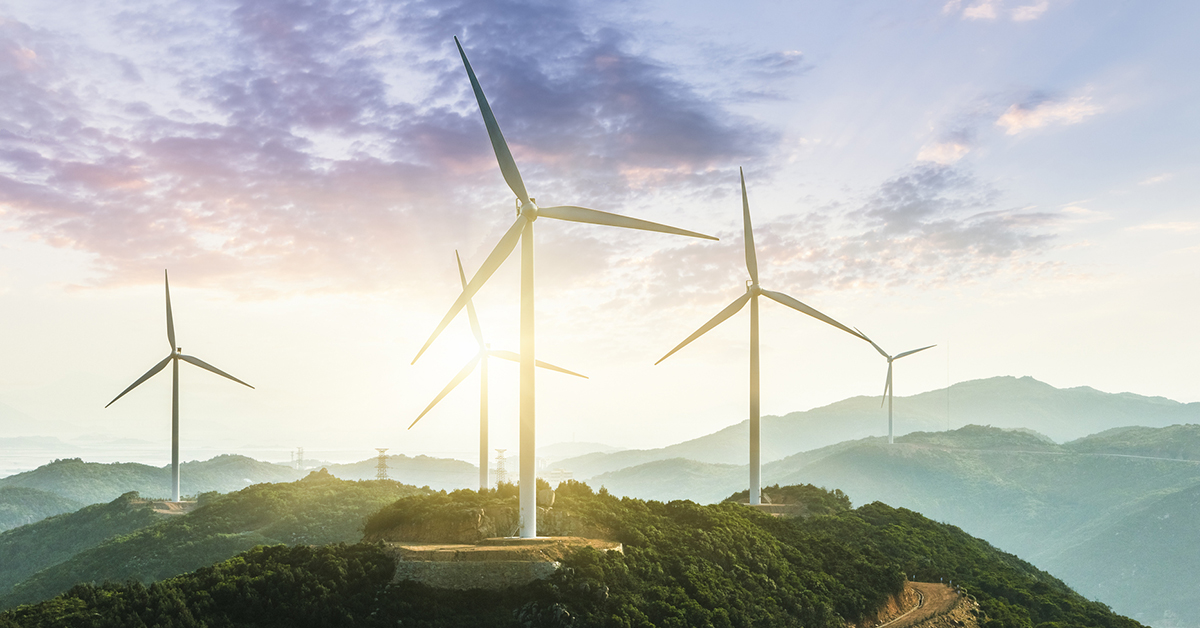How to Invest in Natural Resources: Diversify Your Portfolio from the Ground Up
28 June 2024
Read Time 5 MIN
Share with a Friend
All fields required where indicated (*)Natural Resources Come in Many Different Forms
Natural resources include traditional commodities like oil and gas, base and precious metals, as well as technologies and materials supporting the multi-decade transition to renewables. This expansive boundary offers a far-ranging opportunity set stretching well beyond traditional commodity markets. For example, the shift towards renewable energy is creating soaring demand for non-traditional commodities. Minerals like lithium, zinc and manganese are essential components of clean technologies.
Minerals Used in Clean Energy Technologies
Source: IEA. Data as of May 2021.
From an investment perspective, VanEck classifies global natural resources into the following categories: oil & gas, renewables & alternatives, base & industrial metals, gold & precious metals, agriculture, paper & forest, industrials & utilities and other materials.
Natural Resources Deliver a Wide Range of Investment Benefits
Historically, global resources and commodity investments have been an excellent way to diversify broader stock and fixed income portfolios and hedge against inflation:
-
Diversification benefits: Natural resources offer strong diversification benefits due to their low correlation with traditional assets like stocks and bonds. When the stock market is volatile or economic conditions change, commodities often behave differently, providing a stabilizing effect on your portfolio. For instance, during economic downturns, while stock prices may plummet, commodity prices like gold can remain stable or even increase, offering a cushion against market shocks.
- Inflation hedge: Historically, global resource and commodities have acted as a hedge against inflation, outperforming U.S. stocks and bonds. Even in periods of modest inflation (2-6%) global resources and commodities have outperformed U.S. stocks.
Average 12-Month Return in Varying Inflation Regimes
Source: VanEck, Bloomberg, CRSP, FactSet, World Bank. Data as of December 2023. Past performance is no indication of future results.
Tapping into Global Growth
From traditional commodities like oil and gas to the ongoing transition to renewables, global resources represent the foundation of economic activity.
Emerging Markets and Industrialization
Emerging markets, particularly in Asia, are experiencing significant economic growth, driving the demand for natural resources. As these countries continue to industrialize and urbanize, the need for infrastructure development, manufacturing and energy increases. This surge in demand is particularly evident in:
- Metals: Iron ore, copper and aluminum are crucial for construction, electronics and transportation industries. China's infrastructure projects, including railways, highways and urban developments, have significantly increased the demand for these metals.
- Energy: Traditional energy resources like oil and natural gas remain vital for powering industries and transportation. India's expanding economy has led to a higher consumption of fossil fuels to meet its growing energy needs.
- Agricultural Products: As populations grow and incomes rise, dietary patterns change, increasing the demand for diverse agricultural products. For instance, China's rising middle class has led to higher consumption of meat, driving up the demand for feed grains like soybeans and corn.
Transition to Clean Energy Technologies
The global shift towards renewable energy and sustainable technologies is another critical factor driving the demand for specific natural resources. This transition is essential for combating climate change and reducing dependence on fossil fuels. Key areas include:
- Battery Metals: The rise of electric vehicles (EVs) and renewable energy storage solutions has led to a surge in demand for battery metals like lithium, cobalt and nickel. Lithium-ion batteries, which power EVs and store solar and wind energy, are central to this green revolution.
- Renewable Energy Infrastructure: The construction of solar panels, wind turbines and hydroelectric plants requires significant amounts of metals like rare earth elements and aluminum. Governments worldwide are investing heavily in renewable energy projects, further driving the demand for these resources.
Supply Constraints and Investment Opportunities
While the demand for natural resources continues to grow, supply constraints pose challenges and create investment opportunities. Key supply-side factors include:
- Mining Challenges: Extracting minerals and metals from the earth is becoming increasingly difficult and costly. Deeper mines, lower ore grades and stricter environmental regulations are some of the factors contributing to these challenges. Investors can capitalize on companies that innovate in mining technologies or hold high-quality resource deposits.
- Agricultural Disruptions: Climate change, extreme weather events and diseases can significantly impact agricultural production. These disruptions can lead to supply shortages and higher prices for agricultural commodities. Investing in agricultural technologies, such as drought-resistant crops or precision farming, can provide exposure to potential gains from these challenges.
Risk Considerations
Investing in natural resources comes with a unique set of risks. Commodities tend to be more volatile than other asset classes due to factors like weather conditions, geopolitical tensions and changes in supply and demand. For example, political instability in oil-producing regions can lead to sharp spikes in oil prices. Additionally, commodities markets can be less liquid than stock markets, making it harder to buy and sell assets quickly without affecting their prices. Understanding these risks is crucial before adding natural resources to your portfolio.
Ways to Invest
There are several ways to invest in natural resources:
- Buy Physical Commodities: This involves purchasing the actual commodity, such as gold bars or agricultural products. While it offers direct exposure, storage and security can be challenging.
- Invest in Companies: Buying stocks of companies involved in the extraction, production and distribution of natural resources, such as mining firms or oil companies, provides indirect exposure to commodity prices.
- Futures Contracts: These financial instruments allow you to agree to buy or sell a commodity at a future date and price, providing leverage and potentially higher returns, but also higher risk.
- ETFs and Mutual Funds: These funds pool investor money to buy a diversified portfolio of commodities or commodity-related companies, offering a more manageable way to gain exposure to natural resources with professional management.
Incorporating natural resources into your investment portfolio can offer significant benefits, including diversification, inflation protection and the potential to capitalize on global growth trends. However, it is essential to be aware of the risks involved and to choose the appropriate investment method based on your risk tolerance and investment goals. By carefully considering these factors, you can effectively leverage natural resources to enhance and diversify your investment portfolio.
VanEck Natural Resources and Commodities Solutions
VanEck has a history of investing in natural resources and commodities for over 50 years, offering investors actively and passively managed strategies, from physical commodities to natural resource equities. We offer specialized exposure to individual sectors and diversified solutions with broad exposure across sectors and industries.
VanEck Global Mining UCITS ETF (GDIG)
Access to global companies primarily involved in the metal and mineral extraction industries.
VanEck Gold Miners UCITS ETF (GDX)
The nation's first ETF that offers direct exposure to the gold mining industry, which may provide leverage to rising gold prices.
VanEck Junior Gold Miners UCITS ETF (GDXJ)
Access to junior gold miners, including smaller exploratory or early development phase companies that are responsible for many gold reserve discoveries worldwide.
VanEck Rare Earth & Strategic Metals UCITS ETF (REMX)
One-Trade access to the Rare Earth and Strategic Metals Industry : production, refinement, and recycling of rare earth and strategic metals.
VanEck Oil Services UCITS ETF (OIHV)
Offers exposure to enterprises involved into the upstream oil services sector.
VanEck Uranium and Nuclear UCITS ETF (NUCL)
Offers exposure to companies involved in the nuclear energy industry, from reactor manufacturers to uranium miners.
VanEck Hydrogen Economy UCITS ETF (HDRO)
Offers exposure to hydrogen worldwide innovation leaders building new ecosystems to reach zero-carbon emissions.
VanEck Global Resources UCITS (Equity Fund)
This mutual fund offers exposure to companies active in the exploration, development, production or distribution of "hard assets.
Risk of investing in smaller companies: The securities of smaller companies may be more volatile and less liquid than the securities of large companies. Smaller companies, when compared with larger companies, may have a shorter history of operations, fewer financial resources, less competitive strength, may have a less diversified product line, may be more susceptible to market pressure and may have a smaller market for their securities.
Industry or Sector Concentration Risk: The Fund’s assets may be concentrated in one or more particular sectors or industries. The Fund may be subject to the risk that economic, political or other conditions that have a negative effect on the relevant sectors or industries will negatively impact the Fund's performance to a greater extent than if the Fund’s assets were invested in a wider variety of sectors or industries
Risk of Investing in Natural Resources Companies: Investments in natural resources and natural resources companies, which include companies engaged in alternatives (e.g., water and alternative energy), base and industrial metals, energy and precious metals, are very dependent on the demand for, and supply and price of, natural resources and can be significantly affected by events relating to these industries, including international political and economic developments, embargoes, tariffs, inflation, weather and natural disasters, limits on exploration, often changes in the supply and demand for natural resources and other factors.
Emerging Markets Risk: Investments in emerging market countries are subject to specific risks and securities are generally less liquid and less efficient and securities markets may be less well regulated. Specific risks may be heightened by currency fluctuations and exchange control; imposition of restrictions on the repatriation of funds or other assets; governmental interference; higher inflation; social, economic and political uncertainties.
Liquidity risk: Exists when a particular financial instrument is difficult to purchase or sell. If the relevant market is illiquid, it may not be possible to initiate a transaction or liquidate a position at an advantageous or reasonable price, or at all.
To receive more ETF insights, sign up to our newsletter.
IMPORTANT INFORMATION
This is a marketing communication for professional investors only. Please refer to the UCITS prospectus and to the Key Investor Information Document (KIID) before making any final investment decisions.
This information originates from VanEck Securities UK Limited (FRN: 1002854), an Appointed Representative of Sturgeon Ventures LLP (FRN: 452811), who is authorised and regulated by the Financial Conduct Authority in the UK. The information is intended only to provide general and preliminary information to FCA regulated firms such as Independent Financial Advisors (IFAs) and Wealth Managers. Retail clients should not rely on any of the information provided and should seek assistance from an IFA for all investment guidance and advice. VanEck Securities UK Limited and its associated and affiliated companies (together “VanEck”) assume no liability with regards to any investment, divestment or retention decision taken by the investor on the basis of this information. The views and opinions expressed are those of the author(s) but not necessarily those of VanEck. Opinions are current as of the publication date and are subject to change with market conditions. Certain statements contained herein may constitute projections, forecasts and other forward-looking statements, which do not reflect actual results. Information provided by third party sources is believed to be reliable and have not been independently verified for accuracy or completeness and cannot be guaranteed. Brokerage or transaction fees may apply.
VanEck Asset Management B.V., the management company of VanEck Global Mining UCITS ETF (the "Fund"), a sub-fund of VanEck UCITS ETFs plc, is a UCITS management company incorporated under Dutch law and registered with the Dutch Authority for the Financial Markets (AFM). The Fund is registered with the Central Bank of Ireland, passively managed and tracks an equity index. Investing in the ETF should be interpreted as acquiring shares of the ETF and not the underlying assets.
VanEck Asset Management B.V., the management company of VanEck Gold Miners UCITS ETF (the "ETF"), a sub-fund of VanEck UCITS ETFs plc, is a UCITS management company incorporated under Dutch law and registered with the Dutch Authority for the Financial Markets (AFM). The ETF is registered with the Central Bank of Ireland, passively managed and tracks an equity index. Investing in the ETF should be interpreted as acquiring shares of the ETF and not the underlying assets.
VanEck Asset Management B.V., the management company of VanEck Junior Gold Miners UCITS ETF (the "Fund"), a sub-fund of VanEck UCITS ETFs plc, is a UCITS management company incorporated under Dutch law and registered with the Dutch Authority for the Financial Markets (AFM). The Fund is registered with the Central Bank of Ireland, passively managed and tracks an equity index. Investing in the ETF should be interpreted as acquiring shares of the ETF and not the underlying assets.
VanEck Asset Management B.V., the management company of VanEck Rare Earth and Strategic Metals UCITS ETF (the "ETF"), a sub-fund of VanEck UCITS ETFs plc, is a UCITS management company incorporated under Dutch law registered with the Dutch Authority for the Financial Markets (AFM). The ETF is registered with the Central Bank of Ireland, passively managed and tracks an equity index. Investing in the ETF should be interpreted as acquiring shares of the ETF and not the underlying assets.
VanEck Asset Management B.V., the management company of VanEck Oil Services UCITS ETF (the "ETF"), a sub-fund of VanEck UCITS ETFs plc, is a UCITS management company incorporated under Dutch law registered with the Dutch Authority for the Financial Markets (AFM). The ETF is registered with the Central Bank of Ireland, passively managed and tracks an equity index. Investing in the ETF should be interpreted as acquiring shares of the ETF and not the underlying assets.
VanEck Asset Management B.V., the management company of VanEck Uranium and Nuclear Technologies UCITS ETF (the "ETF"), a sub-fund of VanEck UCITS ETFs plc, is a UCITS management company incorporated under Dutch law registered with the Dutch Authority for the Financial Markets (AFM). The ETF is registered with the Central Bank, passively managed and tracks an equity index. Investing in the ETF should be interpreted as acquiring shares of the ETF and not the underlying assets.
VanEck Asset Management B.V., the management company of VanEck Hydrogen Economy UCITS ETF (the "ETF"), a sub-fund of VanEck UCITS ETFs plc, is a UCITS management company incorporated under Dutch law registered with the Dutch Authority for the Financial Markets (AFM). The ETF is registered with the Central Bank of Ireland, passively managed and tracks an equity index. Investing in the ETF should be interpreted as acquiring shares of the ETF and not the underlying assets.
VanEck Asset Management B.V., the management company of VanEck Global Resources UCITS (the "Fund"), a sub-fund of VanEck ICAV, is a UCITS management company incorporated under Dutch law and registered with the Dutch Authority for the Financial Markets (AFM). VanEck Asset Management B.V. transferred the investment management for the Fund to Van Eck Associates Corporation, an investment company regulated by the U.S. Securities and Exchange Commission (SEC). The Fund is registered with the Central Bank of Ireland and actively managed. Investing in the ETF should be interpreted as acquiring shares of the ETF and not the underlying assets.
Investors must read the sales prospectus and key investor information before investing in a fund. These can be obtained free of charge at www.vaneck.com, from the local information agent Computershare Investor Services PLC or from the Management Company.
All performance information is based on historical data and does not predict future returns. Investing is subject to risk, including the possible loss of principal.
No part of this material may be reproduced in any form, or referred to in any other publication, without express written permission of VanEck.
© VanEck Securities UK Limited
Important Disclosure
This is a marketing communication for professional investors only. Please refer to the UCITS prospectus and to the Key Investor Information Document (KIID) before making any final investment decisions.
This is a marketing communication for professional investors only. Please refer to the UCITS prospectus and to the Key Investor Information Document (KIID) before making any final investment decisions. This information originates from VanEck Securities UK Limited (FRN: 1002854), an Appointed Representative of Sturgeon Ventures LLP (FRN: 452811), who is authorised and regulated by the Financial Conduct Authority in the UK. The information is intended only to provide general and preliminary information to FCA regulated firms such as Independent Financial Advisors (IFAs) and Wealth Managers. Retail clients should not rely on any of the information provided and should seek assistance from an IFA for all investment guidance and advice. VanEck Securities UK Limited and its associated and affiliated companies (together “VanEck”) assume no liability with regards to any investment, divestment or retention decision taken by the investor on the basis of this information. The views and opinions expressed are those of the author(s) but not necessarily those of VanEck. Opinions are current as of the publication date and are subject to change with market conditions. Certain statements contained herein may constitute projections, forecasts and other forward-looking statements, which do not reflect actual results. Information provided by third party sources is believed to be reliable and have not been independently verified for accuracy or completeness and cannot be guaranteed. Brokerage or transaction fees may apply.
All performance information is based on historical data and does not predict future returns. Investing is subject to risk, including the possible loss of principal.
No part of this material may be reproduced in any form, or referred to in any other publication, without express written permission of VanEck.
© VanEck Securities UK Limited
Sign-up for our ETF newsletter
Related Insights
Related Insights
10 June 2024
21 May 2024
16 May 2024
14 May 2024





